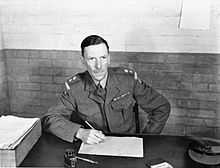James Carne
| James Power Carne | |
|---|---|
 Lieutenant Colonel James Carne c.1953 | |
| Born |
11 April 1906 Falmouth, Cornwall |
| Died |
19 April 1986 (aged 80) Cheltenham, Gloucestershire |
| Place of cremation | Cheltenham Crematorium |
| Allegiance |
|
| Service/branch |
|
| Rank | Colonel |
| Unit | The Gloucestershire Regiment |
| Battles/wars |
Second World War |
| Awards |
Victoria Cross Distinguished Service Order Mentioned in Despatches Distinguished Service Cross (United States) |
Colonel James Power Carne VC, DSO (11 April 1906 – 19 April 1986) was an English recipient of the Victoria Cross, the highest and most prestigious award for gallantry in the face of the enemy that can be awarded to British and Commonwealth forces.
Early life
Carne was born in Falmouth, Cornwall on 11 April 1906 the son of George Newby Carne and Annie Emily Le Poar Carne (née Power).[1] His father was a brewer and wine merchant.[1]
Details
He was 45 years old, and a lieutenant Colonel commanding the 1st Battalion, The Gloucestershire Regiment (British Army) during the Korean War when the following deed took place for which he was awarded the VC:[2]
On 22/23 April 1951 near the Imjin River, Korea, Lieutenant Colonel Carne's battalion was heavily and incessantly engaged by vastly superior numbers of the enemy. Throughout this time Colonel Carne moved among the whole battalion under very heavy mortar and machine-gun fire, inspiring the utmost confidence and the will to resist among his troops. On two separate occasions, armed with rifle and grenades, he personally led assault parties which drove back the enemy and saved important situations. His courage, coolness and leadership was felt not only in his own battalion but throughout the whole brigade.
Prisoner of war
Carne fell into Chinese captivity after his 700-man battalion's astonishing resistance against an estimated 11,000 attackers was finally overcome. As the senior British officer among hundreds of prisoners kept in appalling conditions in camps in communist-held Korea, he was singled out for special treatment. While the other ranks were "re-educated" by the communist commissars at their camps, Carne was kept in solitary confinement.[3]
According to documents held at the National Archives in Kew and not made public until 2006, when Carne was released in September 1953 he told Sir Esler Dening, the British ambassador in Tokyo, "an extraordinary story".[4] "He says that between January 1952 and August this year he was kept in solitary confinement by Chinese communists and subjected to a softening-up process including the use of drugs, [the] result of which was, as he put it, to make his brain like a sponge, capable of receiving any kind of information put into it," Sir Esler told the Foreign Office in a "top secret" category telegram.
The note, which was sent straight to Sir Winston Churchill, in his second term as Prime Minister, went on: "In March of this year, (i.e. about the time when the communists displayed a new interest in concluding an armistice) various thoughts were put in to his mind, and he remains convinced that he was meant to retain these and pass them on to Her Majesty's Government." The thoughts comprised a peace deal not just to end the war in Korea, but to reach a settlement covering the whole Pacific region. Sir Esler opined: "The whole thing might be pure fantasy except for the fact that Colonel Carne could hardly have invented it and does not strike one as that sort of person." The Foreign Office was sceptical about the plot, but suggested that perhaps its aim was to split Britain from its American ally.[5]
Honours and awards
- 13 July 1951 - Lieutenant-Colonel James Power Carne (33647), The Gloucestershire Regiment (missing) is awarded the Distinguished Service Order for gallant and distinguished services in Korea.[6]
- 27 October 1953 - Lieutenant-Colonel James Power Carne, DSO, (33647), The Gloucestershire Regiment, is awarded the Victoria Cross in recognition of gallant and distinguished service in Korea.[7] His Victoria Cross is held by the Soldiers of Gloucestershire Museum, Gloucester, Gloucestershire, England.[8]
- 30 October 1953 - Lieutenant-Colonel James Power Carne, VC, DSO (33647). The Gloucestershire Regiment is given permission to wear the Distinguished Service Cross conferred by the President of the United States for gallant and distinguished services during operations by the United Nations in Korea.[9]
![]()
![]()
![]()
![]()
![]()
![]()
![]()
![]()
![]()
![]()
References
- ↑ 1.0 1.1 1911 Census of Falmouth, RG14/13892, George Power Carne, 8 Cambridge Place, Falmouth, Cornwall.
- ↑ London Gazette
- ↑ The Daily Telegraph, 8 November 2006
- ↑ Daily Telegraph
- ↑ The Daily Telegraph 8 November 2006
- ↑ The London Gazette: (Supplement) no. 39285. p. 3810. 13 July 1951. Retrieved 30 July 2010.
- ↑ The London Gazette: (Supplement) no. 39994. p. 5693. 27 October 1953. Retrieved 30 July 2010.
- ↑ The Soldiers of Gloucestershire Museum
- ↑ The London Gazette: (Supplement) no. 39999. p. 5767. 30 October 1953. Retrieved 30 July 2010.
- The Last Eleven? (Mark Adkin, 1991)
- Monuments to Courage (David Harvey, 1999)
- The Register of the Victoria Cross (This England, 1997)
External links
- Location of grave and VC medal (Gloucestershire)
- Lieutenant Colonel James Carne (detailed account of the Battle of the Imjin River)
- James Carne
- "James Carne". Find a Grave. Retrieved 1 January 2010.